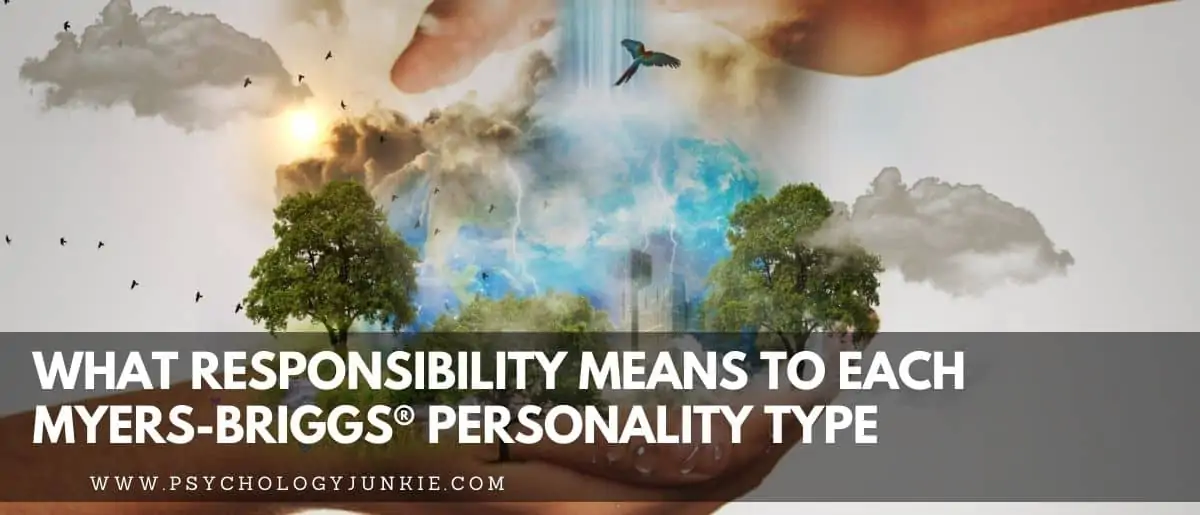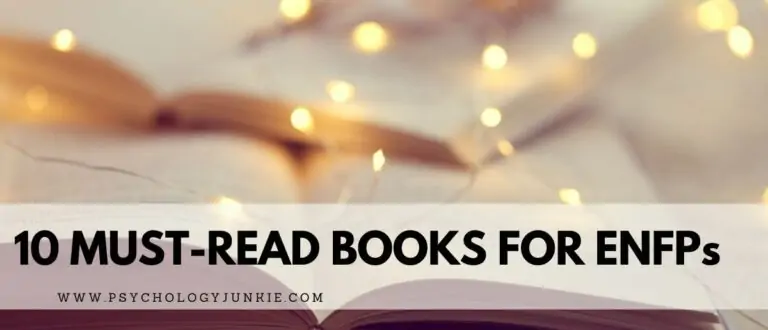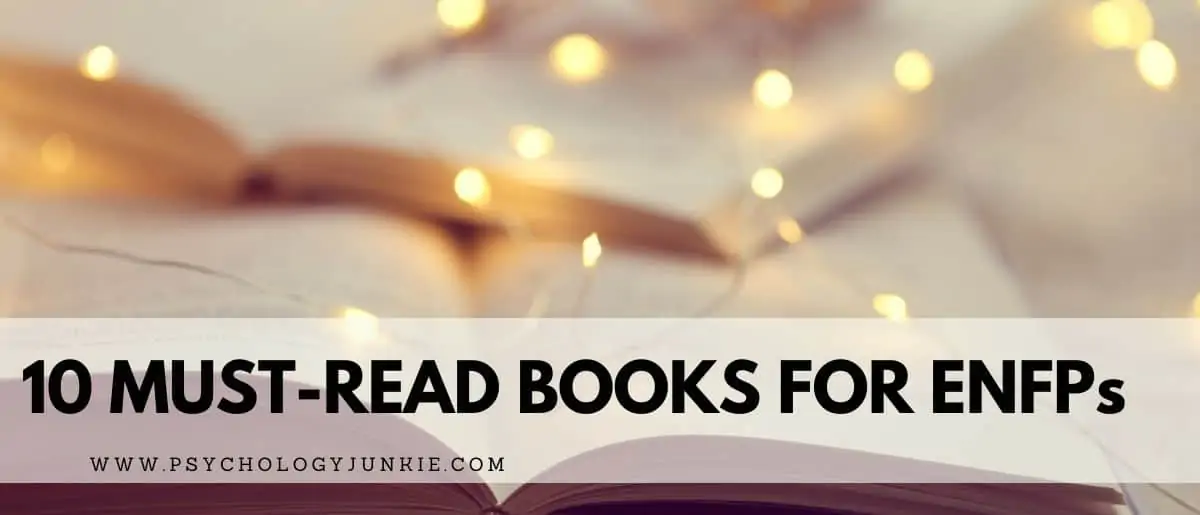What Responsibility Means to Each Myers-Briggs® Personality Type
When reading about various personality types, you’re bound to hear the word “Responsible” attached to certain types; usually Judgers. But nobody just wakes up one day and thinks, “I want to be an irresponsible cad when I grow up.” In fact, responsibility is a rather subjective word. It can mean different things to different people. While some types are responsible about paying their bills on time, for example, others might be more responsible about hunting down ways to improve the environment or finding the solution to a puzzling dilemma. So with that in mind, we’re going to look at some of the ways each type can be responsible (or irresponsible) today.
Not sure what your personality type is? Take our new personality questionnaire here. Or you can take the official MBTI® here.

Table of contents
Estimated reading time: 15 minutes
What Responsibility Means to Each Personality Type
The ENFP
ENFPs feel responsible to live a life that aligns with their deeply-felt values. These types want to have a job or lifestyle that makes a positive difference in the world. Rather than being led by the promise of a higher paycheck, they’re led by their ideals (and hopefully that translates to a livable income). If they’re not using their talents to make a difference, they tend to feel like their spirit is suffocating. Being able to explore possibilities, brainstorm, and have personal freedom is paramount to them.
ENFPs Feel Responsible To:
- Stay aligned with their personal moral code
- Make a difference in the world
- Be fair
- Be honest and authentic
- Honor their imagination
- Understand people
- Explore ideas and alternatives
- Keep their options open
Average ENFPs Feel Less Responsibility Around:
- Following someone else’s rules
- Keeping a tidy house
- Following a timeline
- Honoring social propriety
- Paying bills on time
- Doing things “by the book”
Read This Next: A Look at the ENFP Leader
The ENFJ
For the ENFJ, life is all about achieving their life’s mission and making their dreams a reality. This often involves deep, empathic connections with other people. No matter how they might try to control it, ENFJs can often sense how other people are feeling and can easily get lost in people’s relationships and life stories. They feel a tremendous responsibility to care for others and nurture them. Mentoring individuals and helping them find their inner potential is something that drives them.
ENFJs Feel Responsible To:
- Nurture and protect others
- Empathize with people’s situations and feelings
- Resolve conflict quickly
- Influence others to learn and grow
- Find a deeper purpose in life
- Improve the world
Average ENFJs Feel Less Responsibility Around:
- Impersonal tasks that have no immediate human benefit
- Maintenance for household appliances or vehicles
- Physical self-care. May struggle to prioritize their own health.
- Nitty-gritty detailed tasks, like filing taxes or balancing a budget
- Getting their own needs met
Read This Next: 7 Ways That ENFJs Make an Impact
The ENTP
For the ENTP, life is about discovering the underlying principles for all things. These types feel a tremendous responsibility to ask tough questions, find answers, and innovate. A life simply following the rules and going the traditional route would feel like a terrible waste to this type. They need to feel like they’re developing original ideas, looking beneath the surface, and developing new strategies, projects, and ideas. To the ENTP, life is a puzzle that needs to be solved and that is done by playing with different questions, theories, and clues in order to discover a truth no one has discovered before.
ENTPs Feel Responsible To:
- Be skeptical and accurate
- Look at things objectively
- Find ingenious solutions that solve underlying problems
- Bring ideas to fruition
- Play devil’s advocate to discern what’s true
- Look at something from many angles and perspectives
- Be fair with others
Average ENTPs Feel Less Responsibility Around:
- Social propriety
- Following others’ rules
- Timeliness
- Household maintenance or cleanliness
- Giving directions
- Following a strict moral code without question
Read This Next: A Look at the ENTP Leader
The ENTJ
ENTJs yearn to use everything around them to accomplish a far-reaching goal. Visionary and directive, they enjoy conceptualizing long-term ideas and then getting everyone on board to make those ideas come to fruition. It’s natural for these types to take charge of ineffective situations and create structure, organize prioritize, and streamline operations. They are typically responsible about anything involving their careers and place a high priority on being honest and doing what they believe is right.
ENTJs Feel Responsible To:
- Accomplish objectives in a timely manner
- Make their surroundings as efficient as possible
- Strategically coordinate projects
- Understand the deeper meaning of life
- Manage money effectively
- Be honest and direct
- Prioritize tasks wisely
- Learn and logically analyze things
- Stay objective during decisions
Average ENTJs Feel Less Responsibility Around:
- Nurturing others’ emotions
- Cooking or detailed cleaning
- Physical and emotional self-care
- Relaxing and recharging
- Nitty-gritty details – Would rather develop a plan where those are taken care of in an automatic way
- Processing their own emotions and feelings
The INFP
Gentle and sensitive, INFPs feel a deep need to have integrity and to live in congruence with what they believe is right. Hypocrisy is anathema to them; to preach one thing and do another is the very thing they are determined not to do with their lives. Having a purpose and exploring the richer meanings of life drives them to introspect, question, imagine, and analyze. They are highly intuitive about people and can often sense unsaid needs or feelings that others’ don’t realize they’re picking up on. Helping people to understand themselves and clarify their values is something that gives them a great deal of joy.
INFPs Feel Responsible To:
- Live according to their code of ethics
- Understand their purpose
- Understand people and where they’re coming from
- Contemplate life’s mysteries
- Trust their intuition
- Be honest and authentic
- Know who they are
- Actively listen to others
Average INFPs Feel Less Responsibility Around:
- Household maintenance tasks
- Other people’s rules
- Financial tasks like balancing a budget or filing taxes
- Keeping the home neat, tidy, and/or organized
- Timelines
- Staying objective during decisions
It’s important to note that these issues of less responsibility can vary greatly from person to person. One INFP may have developed a personal code about keeping the home neat for his or her family, while another might have developed a liking for balancing the budget so they can donate more to charity. These responsibility-issues are typical, but never guaranteed. Every individual is unique.
Read This Next: 24 Signs That You’re an INFP, the Dreamer Personality Type
The INFJ
Visionary and complex, INFJs are driven to find their purpose and grow as individuals to be the best they can possibly become. This doesn’t mean winning fancy awards necessarily; it means to discover a deep truth about the nature of life and why we’re here and live out that purpose. These types enjoy inspiring others to develop their potential and will do nearly anything to make their visions and insights useful to the world. For them, responsibility is about constantly growing, evolving, and understanding. INFJs like to challenge their minds, push themselves to be more ethical, and understand the mysterious truths of life.
INFJs Feel Responsible To:
- Follow their moral code
- Pursue their vision
- Be tactful and considerate with words
- Accomplish tasks in a timely manner
- Nurture and empathize with others
- Find the deeper meaning of life
- Encourage others to find their potential
Average INFJs Feel Less Responsibility Around:
- Maintenance of household appliances
- Routine maintenance of vehicles
- Physical self-care (Tends to put others’ needs before own)
- Getting adequate rest
- Following tradition
- Managing or instructing others by giving criticism or sequential directions
Read This Next: The 10 Best Careers for INFJs
The INTP
To know and understand is the primary goal of the INTP. These types live to explore, analyze, and learn about the world and the underlying principles and qualities of everything in it. To know enough to “get by” isn’t enough for the INTP, they feel a responsibility to have expertise and mastery. They subject their thoughts and ideas to scrutiny and logically assess what does or doesn’t fit with the whole framework. Pointing out logical inconsistencies and perfecting their understanding of an idea, problem, or theory comes naturally to them.
INTPs Feel a Responsibility To:
- Troubleshoot and solve complex problems
- Give others’ personal space and freedom
- Find the truth and say accurate things
- Understand the logical principles behind things
- Get to the core of something
- Be honest and genuine
- Speak with clarity and precision
INTPs Feel Less Responsibility Around:
- Dealing with nitty-gritty detailed tasks (filing papers, organizing cabinets, etc,.)
- Physical self-care (tend to be more focused on their thoughts than their physical self)
- Nurturing others’ emotions
- Social propriety
- Respecting rank
- Timelines
- Managing others’ work
Read This Next: The Childhood Struggles of INTPs
The INTJ
INTJs have a gift for foreseeing and conceptualizing how things will come to pass in the days ahead. They can easily envision a solution or idea, then mentally organize the path to achieving that vision. Everything is interrelated to the INTJ, and to understand the connections between them is a driving force. They feel a huge responsibility to understand and grasp the big picture and where things are going. Their talent at creating plans, outlining goals, and strategizing a roadmap to an objective is astounding. Conscious of time, they are usually the people who get their tasks done on time without getting distracted or wasting unnecessary steps.
INTJs Feel a Responsibility To:
- Make continual progress and grow
- Achieve objectives in a timely manner
- Stay focused on their vision
- Master their own impulses
- Learn continually
- Outline contingency plans
- Give structure and purpose to the world around them
- Analyze things from many perspectives
Average INTJs Feel Less Responsibility Around:
- Nurturing others’ emotions
- Engaging in tactful small talk
- Attending social gatherings
- Explaining their feelings
- Doing things “by the book”
- Physical self-care (May forget to schedule physical check-ups or eat or drink enough)
Read This Next: 10 Things That Terrify INTJs
The ESFP
Energetic and friendly, ESFPs feel a responsibility to get people involved and make life enjoyable for others (and themselves). But these types aren’t all about play and no work. It’s important to them to get things done, make things happen, and accomplish their objectives – they just want the freedom to organize how they’re going to do it. Being micromanaged is anathema to then. Freedom is paramount to this type, and they can accomplish a lot when they don’t have others pulling the strings on how or when they’ll do something.
ESFPs Feel a Responsibility To:
- Respond quickly in a crisis
- Give others personal freedom
- Help others
- Make others’ lives easier and happier
- Achieve their goals
- Live a meaningful life
- Take on challenges
Average ESFPs Feel Less Responsibility Around:
- Following others’ rules
- Being punctual
- Doing things “by the book”
- Managing others’ work
- Creating long-term plans
- Managing nitty-gritty, impersonal tasks (filing taxes, paying bills on time, balancing a budget)
- Financial savings or retirement plans
Read This Next: Understanding ESFP Sensing
The ESFJ
Warm and considerate, ESFJs get profound joy from bringing people together and connecting with them. They feel a tremendous responsibility to listen to people, help them, and encourage them in whatever projects they’re undertaking. Tactful and nurturing, they create harmonious relationships and are often excellent hosts. Remembering the many details of people’s lives comes naturally to them, and because of this they often know just the right way to support someone or cheer them up.
ESFJs Feel a Responsibility To:
- Be tactful and polite
- Listen to others’ struggles and joys
- Nurture others
- Do things “by the book”
- Be punctual and respect others’ time
- Remember important details
- Dependably complete projects for work, home, and their community on time
- Preserve cherished traditions
- Attending social events
Average ESFJs Feel Less Responsibility Around:
- Getting their own needs met (tend to put others first)
- Critiquing or giving constructive criticism
- Troubleshooting complex problems
- Understanding the ins and outs of how something works
- Speaking with precision and getting right to the point
The ESTP
Engaging and energetic, ESTPs like a life that is filled with excitement, action, and accomplishment. They enjoy making things happen and have a desire to “win” at whatever they’re doing. Pushing the limits of what they’re capable of is something that drives them; whether they’re lifting heavier weights than they lifted last week or finding investors for their startup. These types feel a responsibility to live life to the fullest; but not without thinking. Being smart, pragmatic, and resourceful is key.
ESTPs Feel a Responsibility To:
- Challenge themselves
- Make things happen
- Stay present and aware of what’s happening around them
- Accomplish tasks
- Take charge in crisis situations
- Stay grounded and practical
- “Read” people
- Help the people they care about
Average ESTPs Feel Less Responsibility Around:
- Making detailed, long-term plans
- Nurturing others’ feelings
- Being polite
- Reflecting on who they are and what their deeper emotions are telling them
- Foreseeing or predicting distant future events
- Doing things “by the book”
- Managing money carefully
The ESTJ
Hard-working and time-conscious, ESTJs are often seen as the epitome of responsibility. Upholding their families and communities brings them a sense of purpose and joy, and they’re unlikely to let people down when they’ve made a commitment. These types are pragmatic and easily see what needs to be done in a practical sense. Bringing order into chaotic situations and preserving age-old traditions and lessons helps them to create a sense of stability, peace, and continuity, not only in their own lives, but the lives of others.
ESTJs Feel a Responsibility To:
- Complete tasks ahead of time
- Create order and efficiency in their environment
- Teach people about what’s important and give practical guidance
- Preserve cherished traditions and routines
- Follow through on their word
- Be punctual
- Be polite and considerate
- Make decisions in a timely manner
- See things objectively in a logical manner
Average ESTJs Feel Less Responsibility Around:
- Keeping things open-ended
- Sensing other peoples’ emotions
- Finding a deeper abstract meaning in things
- Introspecting on their emotions in order to decipher them
- Keeping their options open
- Looking at things from many different perspectives before deciding
The ISFP
Creative and free-spirited, ISFPs strive to live a life that feels right to them on a soul-level. They want to offer help at just the right time to the people who need it and are often drawn to careers in health care or the arts where they can do some real good or simply brighten peoples’ days. For the ISFP, responsibility isn’t about committing to a schedule or someone else’s rules. It’s about doing what’s right even when it’s hard and providing practical support when it’s needed.
ISFPs Feel a Responsibility To:
- Live according to what they feel is right
- Follow their moral code
- Empathize with the suffering of others
- Be themselves, even if it goes against the mainstream
- Creatively solve problems for others
- Follow through on their commitments to loved ones
- Maintain their personal freedom and respect others’ freedoms
Average ISFPs Feel Less Responsibility Around:
- Outside schedules and timelines
- Financial management
- Other peoples’ rules
- Bureaucracy
- Managing other people’s work
- Making quick decisions so as not to leave people waiting
- Staying objective when making a personal decision
Read This Next: ISFPs, INFPs and Empathic Mirroring
The ISFJ
Gentle and pragmatic, ISFJs enjoy having a life that is filled with their favorite people and traditions. They have a talent for making sure all the details in their lives are in order and the people they care about are getting their needs met. Making sure their loved ones are safe from harm is a major goal of theirs, and you’ll often find them working behind the scenes to make sure that things go smoothly for them. At the same time, they enjoy peaceful routines and activities in their own time and often have a sentimental, imaginative side that is more private.
ISFJs Feel Responsibility To:
- Protect and take care of their loved ones
- Pay bills on time
- Organize their household to their tastes
- Meet deadlines
- Be polite and considerate
- Empathize with others
- Warn others of potential dangers
- Improve their communities
- Tend to physical needs
Average ISFJs Feel Less Responsibility Around:
- Critiquing others’ work
- Managing others’ time
- Troubleshooting and solving complex problems
- Learning the fine details of how objects work
- Finding the abstract meaning behind things
Read This Next: 10 Characteristics of the ISFJ Child
The ISTP
Keen observers, ISTPs feel a responsibility to respond to their environment in clever, resourceful ways. They usually have a vast storehouse of data in their mind that they can draw from in order to solve whatever problem comes their way. People often count on them during a crisis because of their cool, steady way of analyzing problems. Whatever obstacles show up, they seem to know how to adapt, stay calm, and work around setbacks in order to find a solution.
ISTPs Feel Responsible To:
- Figure out how things work
- Find the best possible approach to solving a problem
- Protect their independence
- Observe their environment attentively
- Help people solve problems
- Show care through action
Average ISTPs Feel Less Responsibility Around:
- Other peoples’ rules
- Nurturing others’ emotions
- Preserving traditions
- Completing projects ahead of time
- Social obligations
- Following a strict moral code without question
The ISTJ
For ISTJs, life is about the meaningful work that improves the lives of others. Sometimes called “The duty fulfillers,” they naturally take responsibility for their careers, money, and families. People often count on them to create plans, prepare, and map out a systematic way to achieve an objective. Deeply loyal, their quiet and steadfast nature gives their loved ones a sense of calm and continuity.
ISTJs Feel Responsible To:
- Pay bills on time
- Manage repairs for household appliances or vehicles
- Create plans and contingency plans
- Be punctual
- Align themselves with their moral code
- Respect others’ privacy
- Prepare for the future
- Finish work before relaxing
- Improve their communities
- Follow the rules
ISTJs Feel Less Responsibility Around:
- Managing others’ emotions
- Finding the abstract meaning behind something
- Contemplating life’s mysteries
- “Reading” people
- Keeping their options open
What Are Your Thoughts?
This article gives just a glimpse of how each type feels about responsibility. But you are a unique individual. What is your experience with responsibility and what are some things you’ve learned that you’d like to share with other readers? Let us know in the comments!
Find out more about your personality type in our eBooks, Discovering You: Unlocking the Power of Personality Type, The INFJ – Understanding the Mystic, The INTJ – Understanding the Strategist, and The INFP – Understanding the Dreamer. You can also connect with me via Facebook, Instagram, or Twitter!

Subscribe to Our Newsletter

Want to discover more about personality type? Get the inside scoop with Susan Storm on all things typological, along with special subscriber freebies, and discounts on new eBooks and courses! Join our newsletter today!













Thank you for posting these! I look forward to them and they are always spot-on. I am blown away by all of the detail you are able to capture for each of these personality types. My husband and I have actually started using them to better understand each other and our children. Thank you!
Regarding the list of what average INFPs feel less responsibility towards: Who, me? LOL You know this INFP so well!
ISFJ lady here!
You definitely hit the nail on the head.
We absolutely feel responsible to take care of others and warn them of danger.
Totally spot on!
I am an ENFJ and this reading of me is spot on. I can easily get subsumed by the drama (or even just the needs) of someone else, forgetting my own direction and purpose in the process.
All true about this INFP, but the ENFP description suits even better.
I guess the sense of responsibility is guided by the system of values, therefore Fe/Fi/Te/Te are the key players, and flavoured by the Ne/Ni/Se/Si functions. So, the E/I variability aside, the article is super accurate and actually helped me type some people better than other sources. Thanks Susan!